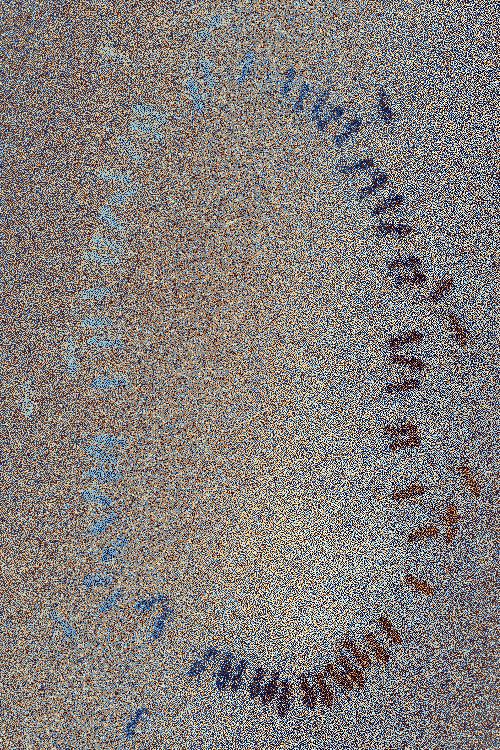Mon 23 September
10:00–22:00
Symposium ON DIALOGICAL REASON #1 with Mahault Albarracin and Ray Brassier
RADIUS is pleased to invite you to the two-day symposium ON DIALOGICAL REASON, with a series of presentations by Mahault Albarracin, Ray Brassier, Catarina Dutilh Novaes, and Reza Negarestani.
The symposium can be followed online here.
‘All fire ants are insects, and all insects are animals, therefore all fire ants are …’ Throughout much of the history of Western philosophy, arguments such as these have been considered monological—reasoning being the work of a single agent—with this conception being epitomised in the deductive form of the syllogism. To this tradition, there has always existed an other: the idea of reason as dialogical, with argumentation conceived of as social, deduction as interactive, and proof as an act (Dutilh Novaes 2020, 30-31; Negarestani 2018, 360). Whereas in the first, knowledge, meaning and truth are fixed, in the second, they are the outcome of dynamical interactions between agents (Trafford 2016).
In the second perspective, dialogue occupies a decisive place in the space of reason—what has been called “the game of giving and asking of reasons”—with each move in the game serving to justify other moves, and those again being justified by yet other moves, with the possibility of the game being played on indefinitely (Brandom 1994, 162). This activity—what Plato once named ‘serious play’—is neither ahistorical (reason takes time) nor apolitical (justice requires justification). Yet without axioms, reasoning becomes self-defeating, every justification requiring another, resulting in an infinite regress only halted by Pyrrhonism (Negarestani 2018, 8). Rationality, therefore, requires both genealogical suspicion (unmasking reasons as causes) and rational explication (extracting reasons from causes), giving rise to a “dialectics between suspicion and trust” (Brassier 2016, 98).
The aim of this event is to bring together philosophers, artists, historians, logicians, social scientists, mathematicians and every other being interested in discussing the themes described above. The content of the event will be reflected in the form: all presentations will be followed by dialogues, interaction will be favored over exposition, (critical) engagement will be valued, haranguing not appreciated. Inquiries can be sent to Ties van Gemert (P.T.vanGemert@tilburguniversity.edu) and Sonia de Jager (dejager@esphil.eur.nl).
SPEAKER BIOGRAPHIES
⌀ Mahault Albarracin is a doctoral candidate in Cognitive Computing at the Université du Québec à Montréal. She has published extensively on active inference in epistemic interactions and the architecture of consciousness.
⌀ Ray Brassier is a professor at the Department of Philosophy of the American University of Beirut. He is the author of Nihil Unbound: Enlightenment and Extinction (2007).
⌀ Catarina Dutilh Novaes is a professor at the Department of Philosophy of the Vrije Universiteit Amsterdam. Her monograph The Dialogical Roots of Deduction (2020) won the 2022 Lakatos Award.
⌀ Reza Negarestani is the director of the critical philosophy program at the New Centre for Research and Practice. He is the author of Intelligence and Spirit (2018) and Abducting the Outside (2024).
⌀ Inigo Wilkins is a philosopher working across many disciplines. He is co-director of the online journal and research platform Glass Bead, of the Noise Research Union, and of SSTRAPP. His forthcoming book is called Irreversible Noise (Urbanomic).
PROGRAM
⌀ 10:00 – 10:30: Freya Häberlein – Values in Dialogical Reason
⌀ 10:30 – 11:00: Errol Boon – Dialectics and the Finitude of Discursive Reason
⌀ 11:00 – 12:00: Dialogue
⌀ 13:00 – 13:30: Iyad Raya – No Space for Idiocy
⌀ 13:30 – 14:00: Zoheir Bagheri Noaparast – Deep Philosophical Disagreements: A Critical Assessment of Constitutivism
⌀ 14:00 – 15:00: Dialogue
⌀ 16:00 – 16:30: Brynn McNab – Consciousness is originarily not an “I think that,” but rather an “I can.”
⌀ 16:30 – 17:00: Evert Boonstra – The Dialectics of Drive
⌀ 17:00 – 18:00: Dialogue
⌀ 19:00 – 19:45: Mahault Albarracin
⌀ 19:55 – 20:40: Ray Brassier
⌀ 20:45 – 22:00: Dialogue moderated by Inigo Wilkins
PRACTICAL INFORMATION
⌀ Date: Monday 23 and Tuesday 24 September
⌀ Doors open: 18:30
⌀ Presentations: 19:00 – 22:00
⌀ Language: English
⌀ Free admission, R.S.V.P. required
⌀ Location: RADIUS Water Tower, Kalverbos 22
⌀ Note that the location is not wheelchair accessible. Please get in contact with us to discuss alternative ways to allow your participation.
⌀ This event is funded by NWO (PGW.20.021) and the Evert Willem Beth Foundation (KNAW WF/2463 – 25).
⌀ On the 22nd of September RIB is organising an event which serves as a prolegomenon to the Dialogical Reason conference, you can find more information on that here.
REFERENCES
⌀ Albarracin, Mahault, Demekas, Daphne, Ramstead, Maxwell J.D., Heins, Conor. 2022. “Epistemic Communities under Active Inference.” Entropy 24(4): https://doi.org/10.3390/e24040476.
⌀ Brassier, Ray. 2016. “Dialectics Between Suspicision and Trust.” Stasis 4(2): https://doi.org/10.33280/2310-3817-2016-4-2-98-113.
⌀ Brandom, Robert B. 1994. Making It Explicit: Reasoning, Representing, and Discursive Commitment. Harvard: Harvard University Press.
⌀ Dutilh Novaes, Catarina. 2020. The Dialogical Roots of Deduction. Cambridge: Cambridge University Press.
⌀ Negarestani, Reza. 2018. Intelligence and Spirit. Falmouth: Urbanomic.
⌀ Trafford, James. 2016. Meaning in Dialogue: An Interactive Approach to Logic and Reasoning. Cham: Springer.
